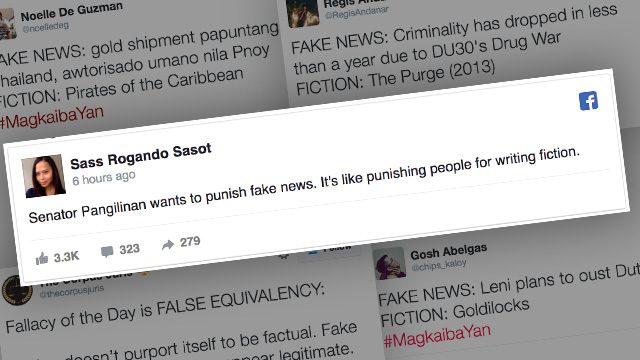SUMMARY
This is AI generated summarization, which may have errors. For context, always refer to the full article.

MANILA, Philippines – “Fake news” and #MagkaibaYan trended on Twitter a day after Senator Trillanes filed a Senate resolution urging a probe into the “proliferation of false, erroneous, distorted, fabricated and/or misleading news and information on social media, as well as on the so-called social media trolls.”
Senator Francis Pangilinan raised the same concerns, and filed Senate Resolution 271 to hold Facebook accountable for its inaction to address the spread of fake news. “More than being an online platform, Facebook may be described as a de facto media company or publisher that should be responsible and accountable for the content it distributes and allows to be distributed, in order to protect the national discourse from fabricated and false news.” (Read: To curb hoaxes, Facebook must accept it’s a media company)
A vocal supporter of President Rodrigo Duterte, Sass Rogando Sasot, expressed disapproval of the measure: “Senator Pangilinan wants to punish fake news. It’s like punishing people for writing fiction.”

In response, people on Twitter pointed out the gap in Sasot’s logic:
Fake News – Curated tweets by rapplerdotcom
While fiction and fake news share the same quality of being imaginary, a work of fiction is different from fake news in both form and purpose. Fake news are hoaxes that purport to be from reputable news sites in order to spread misinformation and propaganda. Fake news can sometimes dupe readers into thinking they are legitimate by using dubious URLs that mimic those of existing news outfits.
Fiction, on the other hand, is defined by the Oxford dictionary as prose “that describes imaginary events and people.” – Rappler.com
Add a comment
How does this make you feel?
There are no comments yet. Add your comment to start the conversation.